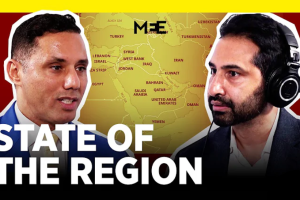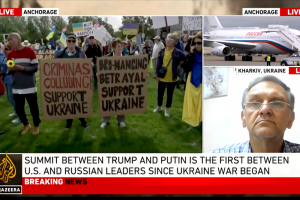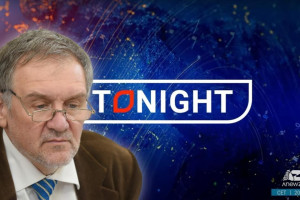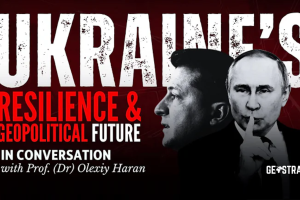Can Poroshenko Control Ukraine’s Right Wing?
The Ukrainian leader’s newest opponents are in his own parliament.

With a shaky cease-fire between Ukrainian forces and Russian-backed rebels appearing to hold, one of Ukrainian President Petro Poroshenko’s most immediate challenges may come from nationalist parties within his own government, and not from his erstwhile opponents in Moscow.
In the coming months, Ukraine’s parliament is expected to vote on legislation to transfer power away from Kiev — a key component of the Minsk II cease-fire agreement brokered by Germany, France, Ukraine, and Russia in February. Under the terms of the accord, Kiev is required to grant more autonomy to eastern Ukraine, many of whose residents seek closer ties to Moscow, while Russia is required to withdraw its military hardware and volunteer fighters.
The problem is that Poroshenko currently does not have the votes to amend the Ukrainian Constitution due to opposition from nationalist groups like the Radical Party, Right Sector, and now even political parties beyond the radical fringe, which fear that the legislation will undermine the country’s sovereignty and independence.
The impasse threatens to erode the Minsk peace deal and reignite violence between the warring sides. And that impasse may not be disappearing anytime soon. In an interview, Ukraine’s new ambassador to the United States said the only way to break the deadlock would be for Russia to withdraw militarily from the conflict — a step that many doubt Putin will take.
“If we see real progress on the withdrawal of troops and weapons, then the pace of [constitutional reform] will go very quickly,” Ukrainian Ambassador Valeriy Chaly said in a wide-ranging interview with Foreign Policy at the Ukrainian Embassy in Washington. “Ukraine goes further and further with difficult political compromises, but there has been no major progress on the withdrawal of weapons.”
Kiev’s insistence that Moscow move first has worried some experts because it appears to be laying the groundwork for Ukraine to use Russian intransigence as an excuse to delay needed reforms.
Matthew Rojansky, a Ukraine expert at the Wilson Center, said Poroshenko faces real constraints in his parliament. Still, Rojansky noted, “in Ukrainian politics, playing the Russian card has always been less a recipe for action than a substitute for it.”
Others say Ukraine has every right to slow-roll reforms given the sustained presence of Russian troops along the Ukrainian border and heavy artillery in the hands of rebels. “Until Russia does serious implementation of Minsk, Ukraine shouldn’t be required to make constitutional reforms,” said John Herbst, a former U.S. ambassador to Ukraine and a director at the Atlantic Council.
Chaly, who assumed his post in Washington in July, is a close confidant of Poroshenko and previously served as his foreign-policy advisor. A quick and witty conversationalist, he differs in style from his predecessor, Oleksandr Motsyk, a more reserved old-school emissary appointed by now-ousted President Viktor Yanukovych.
In acknowledging Poroshenko’s difficult
political challenges at home, Chaly noted that his boss’s
decentralization legislation has
grown increasingly unpopular in Ukraine.
In acknowledging Poroshenko’s difficult political challenges at home, Chaly noted that his boss’s decentralization legislation has grown increasingly unpopular in Ukraine. “Last year, the majority of Ukrainians supported the political compromises of Minsk,” he said. “But this year, less and less Ukrainians support this process because they see that Russia can stall and keep leverage on Ukraine.”
Decentralization was brought forward in the aftermath of the Maidan protests in 2014 and was proposed as a measure to boost the country’s fledgling democratic reforms. Momentum stalled, however, after the outbreak of fighting in eastern Ukraine and when the shakiness of the second Minsk agreement became apparent, decentralization became tied up in the wider political debate about the status of the rebel-held territories. That, in turn, has further linked Ukraine’s reform agenda to the security situation in the Donbass and has left Poroshenko to balance between an increasingly disenchanted electorate and Western governments eager for progress in eastern Ukraine.
“Special status for occupied areas was imposed on Ukraine in Minsk and looks like a reward for Putin. Many Ukrainians see it as appeasement of Putin from the West,” said Olexiy Haran, a professor of comparative politics at Ukraine’s Kyiv-Mohyla Academy.
A decentralization bill passed a first reading in Ukraine’s parliament in late August, but only served to highlight the difficult path forward for fully implementing the Minsk agreement. During the boisterous parliamentary session, Poroshenko came under fire from both the opposition and his own pro-European coalition, which accused the president of caving to Russia. After the vote, protests outside led by the ultranationalist party Svoboda left four members of the National Guard dead.
To be ratified as a constitutional amendment, the decentralization bill will need to pass a second and final reading with at least 300 of the parliament’s 450 deputies voting in favor — up from the 265 who voted on the first reading. How — and if — Poroshenko can corral the necessary votes remains to be seen.
“It’s not impossible,” said Steven Pifer, a former U.S. ambassador to Ukraine and a senior fellow at the Brookings Institution. “It will require lots of legwork by Poroshenko, and it’s going to be a very tough political fight.”
Decentralization in the Donbass has become so fraught in part because neither side has fully taken the first step in implementing the Minsk peace deal. From Moscow’s viewpoint, Ukraine is not living up to its promises on autonomy; from Kiev’s viewpoint, Russia has endangered the agreement by refusing to reduce its military presence in the east.
“One of the key problems with Minsk II is that it does not specify how some steps are to be sequenced,” said Pifer.
As part of Minsk, Ukraine is demanding the withdrawal of Russian military forces, military hardware, and volunteer fighters from Ukraine; the pullback of artillery from the eastern front; free access for cease-fire monitors sent by the Organization for Security and Co-operation in Europe (OSCE); and restored Ukrainian control over its southeastern border with Russia.
Meanwhile, Moscow has been advocating for “federalizing” Ukraine throughout the 18-month crisis, a move that would give the rebel-held regions of Donetsk and Luhansk increased autonomy from Kiev, including the power to conduct foreign and trade policies. Ukraine has vehemently opposed the idea and has instead pushed for decentralization, a different model that would give the country’s regions increased local decision-making authority and more revenue-sharing from the central government.
Kiev insists that decentralization
upholds its obligations under the Minsk agreement,
but major gaps remain before any progress can be made.
Kiev insists that decentralization upholds its obligations under the Minsk agreement, but major gaps remain before any progress can be made.
Another looming issue is elections in the rebel-held territories. The Ukrainian government maintains that elections cannot take place until weapons are pulled back from the front line and control over the Ukraine-Russia border has been entirely restored. Kiev says that elections will be recognized only if they are held according to Ukrainian law and are deemed to meet international standards by OSCE monitors. According to Chaly, without control of the border, it will be difficult to ensure that the elections are fair and that Russia is not interfering.
Over Kiev’s objections, rebel leaders announced plans to hold their own elections on Oct. 18 and in early November. The announcement triggered strong condemnations from the Ukrainian government and risked derailing a renewed truce between Kiev and the rebels that has managed to take hold. The elections were eventually postponed after a meeting in Paris among Poroshenko, Putin, French President François Hollande, and German Chancellor Angela Merkel.
“We have a sustainable cease-fire for the first time in over one and a half years, and it’s an opportunity for real progress,” Chaly said.
How Kiev will take advantage of the relative quiet remains unclear.
“Things would be a lot easier if Russians were making significant strides, but the biggest driver of uncertainty is the fracturing of the political coalition that has supported Poroshenko up to now,” said Andrew Weiss, vice president for studies at the Carnegie Endowment for International Peace. “This is the most complicated domestic political challenge for Poroshenko than at any previous point in his presidency.”
Photo credit: Suhaimi Abdullah/Getty Images








